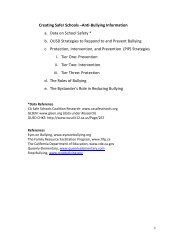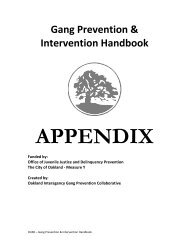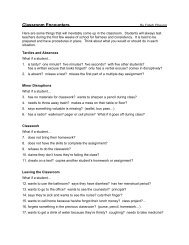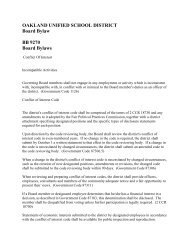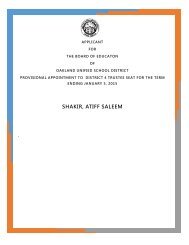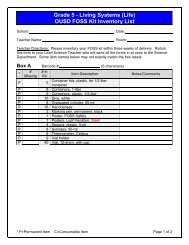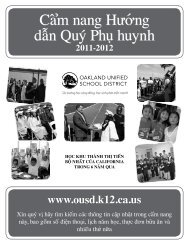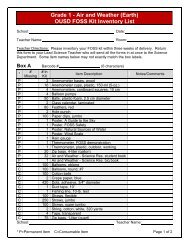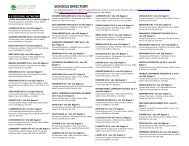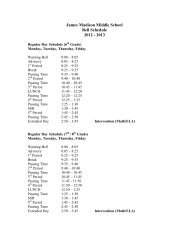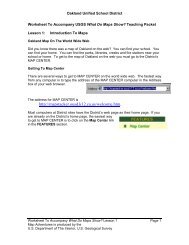Science Framework, part 1 - Free Downloads (CA Dept of Education)
Science Framework, part 1 - Free Downloads (CA Dept of Education)
Science Framework, part 1 - Free Downloads (CA Dept of Education)
- No tags were found...
Create successful ePaper yourself
Turn your PDF publications into a flip-book with our unique Google optimized e-Paper software.
17lends to the study <strong>of</strong> the natural worldis stunning. For example, the position<strong>of</strong> the planets over millions <strong>of</strong> years inthe past can be closely approximated byusing only two strings <strong>of</strong> symbols takenfrom Newton’s laws <strong>of</strong> motion andgravity:F = ma and F = Gm 1m 2/d 2The second assumption is that anyonecan measure the strength <strong>of</strong> a scientifictheory by fairly testing itspredictions. Scientific research papersthus contain not only the results <strong>of</strong> aninvestigation, but all the informationneeded to replicate the research. Thelifetime work <strong>of</strong> many scientists is replicatingother scientists’ experiments inorder to test their conclusions.The third assumption is that individualsand groups can make progresstoward understanding natural phenomena,and their discoveries can be replicatedat any time and suitable place byan objective observer. Truth in scienceknows no cultural or national boundaries.<strong>Science</strong> is not a system <strong>of</strong> beliefsor faith but a replicable body <strong>of</strong> knowledge.In fact, science is incapable <strong>of</strong>answering questions that are based onfaith. Within the scientific community,individuals or groups may sometimessee only what they desire to see or havebeen conditioned to see. Scientificprogress is sometimes stalled by incorrecttheories or results; but once it isshown that those theories or resultscannot be confirmed by others,progress resumes in the correct direction.The scientific method ultimatelyallows for the formulation <strong>of</strong> scientifictheories. Part <strong>of</strong> science education is tolearn what these theories are and tracetheir operation in the world. A theory inpopular language is a collection <strong>of</strong> relatedideas that one supposes to betrue; in science, a theory is defined bythe principles <strong>of</strong> the scientific method.Those principles, in order <strong>of</strong> precedence,are as follows:1. A scientific theory must be logicallyconsistent and lead to testable predictionsabout the natural world.2. The strength <strong>of</strong> a scientific theorylies solely in the accuracy <strong>of</strong> thosepredictions.3. Of two scientific theories that makeaccurate predictions, the theory thatmakes a greater number <strong>of</strong> predictionswith fewer underlying assumptionsis likely to prove stronger.The making and testing <strong>of</strong> predictionsis what distinguishes sciencefrom other intellectual disciplines, andemphasizing the accuracy <strong>of</strong> predictionsrather than the cogency <strong>of</strong> explanationsis the key to scientific progress.A large assortment <strong>of</strong> recorded observationscan <strong>of</strong>ten be accounted forwith explanations that sound good butare nonetheless wrong. Predictionsthat can be tested and verified, however,provide a sound standard bywhich a scientific theory can bejudged.The requirement that a scientifictheory makes predictions might seemto reject as unscientific any theory thatdescribes the past. However, scientifictheories that describe the past (such asthose set forth by geologists, paleontologists,and so forth) do make predictionsabout what will be observed inthe future. For example, if there was amass extinction at the boundary betweenthe Cretaceous and Tertiaryperiods more than 65 million yearsago, then a sample <strong>of</strong> sedimentary rockChapter 2The Nature <strong>of</strong><strong>Science</strong> andTechnology



